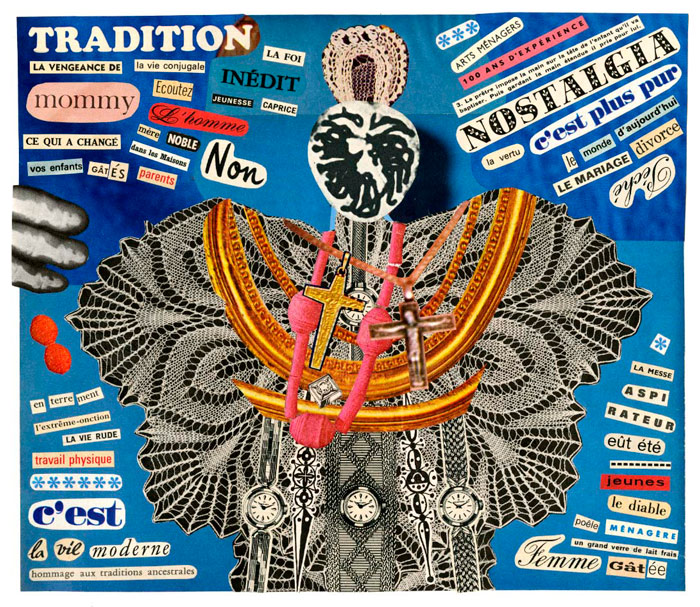
“Words Collide”: Interview With Julie Doucet by Billy Mavreas
Julie Doucet is mostly known as a prolific comic book artist who exploded onto the alternative comics scene in the 1990s with her intricately detailed personal narratives that ranged from surreal dreamscapes to relational neighbourhood tales. Though her many fans may lament her defection from comics they may be unaware that Doucet has never once been idle. We here in Montreal are privileged to witness an astonishing array of her hand-printed booklets, prints, posters, game sets, film and installation. She continually reinvents herself by fearless explorations and elaborate, lovingly crafted productions. The common thread that surfaces time and again in her work is collage. Kolaj reached Julie to discuss how this form affects her art in totality and what the future may hold.
Here is an excerpt from Mavreas’ wide-ranging discussion with Julie Doucet:
MAVREAS: Do you find that the sensibilities inherent in collage are also present in other forms you’ve worked with (print, installation, film, comics)?
DOUCET: In prints yes, very much, but certainly not in comics. In films I guess so, in some of them… I would like to make a film using collage only, but I have seen such good collage work in animation, it’s like what’s the use? I never say things like that, but in this case it really is how I feel about it. I really am not sure I’m doing anything that special, that original, collage-wise, but I love doing it. I can’t stop doing it, that’s pretty much all I do nowadays.
MAVREAS: What are the commonalities of the primary materials that you choose to cut up?
DOUCET: Fifties and sixties women’s magazines and some others, of the same era, like architecture magazines, hobby magazines, Paris Match, Jour de France. The thing is that I am using words in my collages and publications of that era used a big variety of fonts, not to mention the topics and vocabularies. Also, the text is usually not placed in the middle of the pictures, which I don’t like. The colours, the texture of the paper they used to print on… I am not sure it is out of nostalgia, rather than for the material, which is perfect for irony, for subjects like, well, yes, love.
MAVREAS: Tell us about the role text plays in your collage work. How did you come to this form of writing? Is it related to other kinds of writing you’ve done (journal writing, sequential narrative, etc.)?
To read the whole article, purchase Issue Nine or SUBSCRIBE to never miss an issue.
Image:
mommy
by Julie Doucet
collage
2012
Image courtesy of the artist
